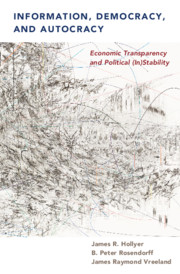Book contents
- Frontmatter
- Dedication
- Contents
- Figures
- Tables
- Acknowledgments
- 1 A New Approach to the Study of Transparency
- PART I FACETS OF TRANSPARENCY
- PART II POLITICAL (IN)STABILITY
- 5 Transparency and (In)stability: The Theory
- 6 The Evidence: Examples and Descriptive Data
- 7 The Evidence: Regression Analyses
- PART III WHY DISCLOSE
- CONCLUSION
- References
- Name Index
- Subject Index
7 - The Evidence: Regression Analyses
from PART II - POLITICAL (IN)STABILITY
Published online by Cambridge University Press: 17 September 2018
- Frontmatter
- Dedication
- Contents
- Figures
- Tables
- Acknowledgments
- 1 A New Approach to the Study of Transparency
- PART I FACETS OF TRANSPARENCY
- PART II POLITICAL (IN)STABILITY
- 5 Transparency and (In)stability: The Theory
- 6 The Evidence: Examples and Descriptive Data
- 7 The Evidence: Regression Analyses
- PART III WHY DISCLOSE
- CONCLUSION
- References
- Name Index
- Subject Index
Summary
Readers may rightly wonder if other factors explain the patterns thus far revealed.We contend, for example, that data dissemination can cause democratization. We have seen that under high levels of data-transparency, autocracies transition to democracies, and we have also seen that democratic rule survives when transparency is high. Yet these processes of democratization correlate with economic development too, and recall from Part I that data dissemination is also correlated with economic development. Modernization theorists might therefore reasonably argue that increasing economic development could explain democratization as well as the general tendency toward data transparency (see, for example, Epstein et al. 2006). Indeed, an empirical connection between GDP per capita and democratic stability has been thoroughly established (Lipset 1959; Przeworski and Limongi 1997; Przeworski et al. 2000; Benhabib, Corvalan, and Spiegel 2011). Perhaps, then, the connection between transparency and democratization is spurious – driven instead by economic development, which causes both phenomena.
Economic liberalization stands as another potential explanation for the patterns we have revealed so far. Maybe data transparency is simply one facet of liberalization and democratization is another. If so, the direction of causality could be reversed or some other overarching cause of the general tendency to liberalize may cause both transparency and democratization.
Alternatively, some readers might simply suggest that time trends explain the patterns. Over time, data dissemination has increased due to rising demand for data and better technology to collect and organize it. Coincident with this trend, autocracy has collapsed around the world, giving rise to more and more stable democracies. Simply because these phenomena trend together over time does not imply a causal connection. The connections of the HRV index to democratization, autocratic instability, mass unrest, and the removal of democratic leaders through regular means may result from historical coincidence.
Other readers may simply wonder if idiosyncratic heterogeneity across individual countries might better explain their experiences of transparency and stability. The experiences of the countries discussed above – South Korea, Mexico, the Philippines, Cote d‘Ivoire, Bulgaria, Bangladesh, Central African Republic, Guinea-Bissau, and Uganda – may each be better explained with reference to the countries’ individual histories, rather than as part of a broader systematic pattern.
- Type
- Chapter
- Information
- Information, Democracy, and AutocracyEconomic Transparency and Political (In)Stability, pp. 172 - 214Publisher: Cambridge University PressPrint publication year: 2018



